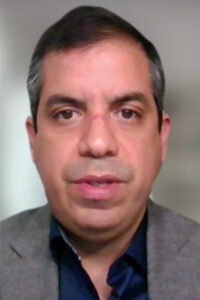Rheumatic diseases are often underdiagnosed and understudied in countries with lower socioeconomic levels.

Three global leaders in rheumatology examined efforts to increase training and infrastructure in three areas of the world to help close these gaps in care during the session Challenges & Innovation in Global Rheumatology Research. The session, which was originally presented Saturday, Nov. 6, can be viewed by registered meeting participants through March 11, 2022.
Dzifa Ida Dey, MD, MSc, FACR, Director of The Rheumatology Initiative (tRi), opened the session with a discussion of tRi’s expansion in Ghana.
In 2012, there was only one rheumatologist in Ghana, with similar situations in neighboring countries, Dr. Dey said. There was a lack of awareness about rheumatologic conditions among patients and caregivers, and a lack of knowledge and diagnostic and management skills among healthcare practitioners that caused misdiagnosis, underdiagnosis, and late diagnosis, she said.
In an effort to improve these conditions, committed individuals were identified and trained in patient care and to help develop models of care. Realistic diagnostic and management criteria were developed and a platform for sharing clinician and researcher expertise in Africa was established. Obtaining government support was also essential.
From the patient perspective, Dr. Dey and her colleagues sought to empower and involve patients in their care. tRi focused on patient education through brochures, newsletters, videos, advocacy, and research.
Medication support is also an important element of the program. Over the past eight years, Dr. Dey said that tRi has helped 53 patients with emergency treatment and helped build an infusion room at the main treatment hospital.
“Over the past years we have educated over 300 medical doctors in rheumatology and been involved in the training of rheumatology nurses in Ghana,” Dr. Dey said.
The program emphasizes leadership to help knowledge “trickle down” among healthcare workers. tRi has also actively advocated to the government and other agencies. As a result, lupus is now on the standard treatment guidelines list and there has been a 25% drop in the price of some biologics, Dr. Dey said.

The session’s second speaker, Manuel F. Ugarte-Gil, MD, MSc, from Universidad Cientifica del Sur/Hospital Guillermo Almenara Irigoyen in Lima, Peru, discussed challenges related to research dissemination and publication in Latin America.
“Publication in Latin America countries is really low compared with the U.S. and the world in general,” he said.
This is due, in part, to how rheumatologists in Latin American have their time divided, Dr. Ugarte-Gil said. About 16.8% of rheumatologists’ time is spent on administrative activities, 50.8% is spent on teaching, and 35% is spent on research, he said.
Other obstacles in Latin America include a lack of vision, Dr. Ugarte-Gil said. Science is not a priority and funding is not coordinated with researchers. Funding in general is also low in Latin American countries, and language can be a barrier to publication of research papers in English, he said.
“Also, some of the best rheumatologists in the region do their training outside of the region and they stay in the U.S. or Europe to improve their careers,” Dr. Ugarte-Gil said.
One obvious solution is making science and research a priority both nationally and locally, he said.
“We have to have collaborative projects within and outside our countries and region, as well as foster mentorship and secure [research] funding,” Dr. Ugarte-Gil said.
International projects like the Global Rheumatology Alliance allow researchers from Latin American countries, as well as countries in Asia and Africa, to collaborate with their peers from the U.S., Canada, or Europe, he noted.
“That is the kind of work we need to continue to do in our region,” Dr. Ugarte-Gil said. “We need to work harder in order to have more of these kinds of opportunities.”

The final speaker, Arvind Chopra, MD, MBBS, FRCP, Director of Rheumatology at the Centre for Rheumatic Diseases in Pune, India, discussed the Community Oriented Program for Control of Rheumatic Diseases (COPCORD), which was launched in the late 1980s by the International League of Associations for Rheumatology (ILAR) in collaboration with the World Health Organization.
COPCORD was created to help understand the effects of musculoskeletal (MSK) pain and arthritis in the developing world. COPCORD is a great example of meaningful, community-driven epidemiologic research by rheumatologists, said Dr. Chopra, who specifically discussed COPCORD India.
In 1996, the COPCORD Bhigwan survey, which included three concurrent phases of research, was completed in just five weeks and has served as a model for researchers at other sites throughout India. In the first phase of the program, researchers identified respondents who suffered from musculoskeletal pain, and these respondents were then systematically evaluated in phases 2 and 3. MSK pain was the most predominant disorder in the community.
“This was a very important first lesson,” Dr. Chopra said.
Another important lesson that has emerged from COPCORD India is that less than 10% of patients suffering from MSK pain in the community have inflammatory arthritis. This distribution pattern has been seen at every Indian site, Dr. Chopra said.
In the last 15 years, COPCORD surveys have been completed at more than 20 sites in India using a questionnaire similar to the one used at the first Bhigwan site. Together, the data has helped researchers obtain a more realistic picture of MSK pain and arthritis in India.
REGISTER TODAY FOR ACR CONVERGENCE
If you haven’t registered for ACR Convergence 2021, register today to access all of the valuable content during the meeting, November 3–10. Registration also includes on-demand access to the virtual platform (session recordings, Poster Hall, Community Hubs, and ShowRheum) until March 11, 2022.


